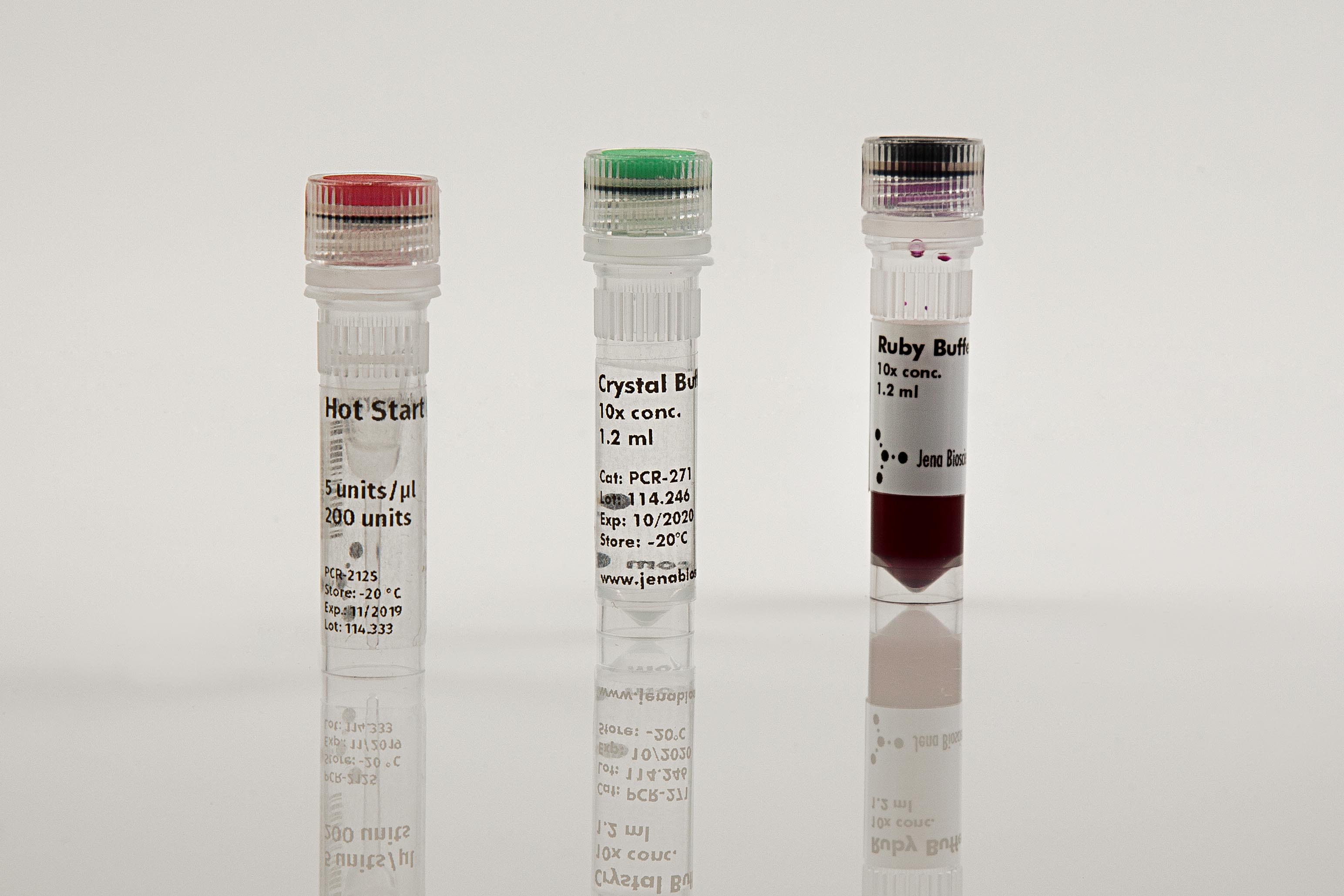Hot Start Polymerase Apta+
Heat-activatable DNA polymerase for high specificity, aptamer-inhibited
Thermus aquaticus, recombinant, E. coli
| Catálogo Nº | Apresentação | Preço (R$) | Comprar |
|---|---|---|---|
| PCR-212S | 200 U | Sob demanda | Adicionar ao Carrinho |
| PCR-212L | 1.000 U | Sob demanda | Adicionar ao Carrinho |

For in vitro use only!
Definição de unidade: One unit is defined as the amount of the enzyme required to catalyze the incorporation of 10 nmoles of dNTP's into an acid-insoluble form in 30 minutes at 70 °C using hering sperm DNA as substrate.
Envio: shipped on blue ice
Condições de armazenamento: store at -20 °C
avoid freeze/thaw cycles
Validade: 12 months
Forma: liquid
Concentração: 5 units/μl
Descrição:
Hot Start Polymerase Apta+ provides improved specificity and sensitivity when amplifying low-copy-number targets in complex backgrounds or when prolonged room-temperature set up is required. The polymerase activity is blocked at ambient temperature and switched on automatically at the onset of the initial denaturation. The thermal activation prevents the extension of nonspecifically annealed primers and primer-dimer formation at low temperatures during PCR setup. The polymerase is recommended for routine PCR applications (up to 4 kb fragment length), high throughput PCR or genotyping.
The Crystal Buffer system guarantees robust and reliable amplification results in almost all PCR applications. The buffer contains a well-balanced ratio of potassium-, ammonium- and magnesium-ions to ensure high specificity and minimal by-product formation without the need of additional optimization steps.
Ruby Buffer additionally contains gel loading buffer and an inherent red dye allowing the direct loading of the PCR product into the gel. The red dye allows an easy visual control during PCR set-up and in combination with the density reagent the direct loading of the reaction product into the gel.
The enzyme replicates DNA at 72 °C. It catalyzes the polymerization of nucleotides into duplex DNA in 5'→3' direction in the presence of magnesium. It also possesses a 5'→3' polymerization-dependent exonuclease replacement activity but lacks a 3'→5' exonuclease (proof-reading) activity.
Activation step
Hot Start Polymerase Apta+ requires no prolonged heating or denaturing step. The polymerase inhibiting aptamer is quickly released at the increased temperature of thermal cycling.
Contente:
Hot Start Polymerase Apta+ (red cap)
5 units/μl aptamer-inhibited hot start polymerase in 20 mM Tris-HCl, 100 mM KCl, 0.1 mM EDTA, 1 mM DTT, 0.5 % Tween-20, 0.5 % Nonidet P-40, 50 % (v/v) Glycerol, pH 8.0 (25°C)
Ruby Buffer (black cap)
10 x conc. complete PCR buffer containing 200 mM Tris-HCl, KCl, (NH4)2SO4 and 20 mM MgCl2, red tracking dye and density reagent for gel loading
Crystal Buffer (green cap)
10 x conc. complete PCR buffer containing 200 mM Tris-HCl, KCl, (NH4)2SO4 and 20 mM MgCl2
component||PCR-212S||PCR-212L||PCR-212XL
Hot Start Polymerase Apta+||200 units / 40 μl||1000 units / 200 μl||5000 units / 1 ml
Ruby Buffer||1.2 ml||5 x 1.2 ml||25 ml
CrystalBuffer||1.2 ml||5 x 1.2 ml||25 ml
Assay Set-Up:
Before starting, vortex all components thoroughly to ensure homogeneity.
Prepare a premix for the number of assays you need according to the following protocol:
comp.||cap||stock conc.||final conc.||1 assay @20 μl||1 assay @ 50 μl
PCR-grade Water||white||||||fill up to 10 μl||fill up to 30 μl
Ruby Buffer or Crystal Buffer||black or green||10x||1x||2 μl||5 μl
dNTP Mix / 10 mM #NU-1006||white||10 mM||200 μM||0.4 μl||1 μl
Hot Start Polymerase Apta+||red||5 units/μl||0.025 units/μl||0.1 μl||0.25 μl
primer mix or each primer||||10 μM each primer||200 - 400 nM each primer||0.4-0.8 μl||1 - 2 μl
template/sample DNA||||||||10 μl < 10 ng DNA||20 μl < 20 ng DNASelect PCR tubes, stipes or plates as recommended for your cycler model.
Aliquot premix into each well and add template DNA (or PCR-grade Water for negative controls).
Cycling Conditions:
Spin down the tubes/plate briefly to remove bubbles and place them into the cycler.
initialdenaturation||95 °C||2 min||1x
denaturationannealing1)elongation2)||95 °C50 - 68 °C72 °C||10 - 20 sec10 - 20 sec20 sec - 4 min||25 - 35x1)The annealing temperature depends on the melting temperature of the primers used.
2)The elongation time depends on the length of the fragments to be amplified. A time of 1 min/kb is recommended.
Gel Loading and Down-Stream Applications:
Ruby Buffer (#PCR-272) includes a density reagent + tracking dye and allows the direct loading of the PCR products into a electrophoresis gel. For DNA detection / fluorescent DNA staining we recommend to use new generations dyes (i.g. SYBR DNA Stain, #PCR-273) instead of the classical but highly mutagenic ethidium bromide.
Crystal Buffer(#PCR-271) is recommended for down-stream applications such as DNA sequencing, ligation, restriction digestion or where an analysis of the PCR product by absorbance or fluorescence excitation is required. For gel electrophoresis add gel loading buffer and fluorescent DNA stain (i.g. Gel Loading Buffer with DNA Stain, #PCR-274 - #PCR-276) before loading the PCR into the gel. Using pre-stained gels or post-run staining protocols is also possible.
Additional Buffer Systems:
Labeling Buffer (#PCR-263) is recommended for DNA labeling or mutagenesis applications. The buffer is specially optimized for incorporation of labeled or modified nucleotides into DNA. It gives superior results in a broad range of reaction conditions with most primer-template pairs but amplification may also tend to an increased unspecifity.
KCl Buffer (#PCR-262) is recommended for use in routine PCR reactions. The buffer is optimized for highest specificity but may require additional fine-tuning of assay parameters like MgCl2 concentration and annealing temperature.
Optimization of MgCl2 concentration:
A final Mg2+ concentration of 2.0 mM is recommended in combination with Labeling Buffer. However, if an individual Mg2+ optimization is essential add 25 mM MgCl2 stock solution (#PCR-266) as shown in the table below.
final MgCl2 conc.||20 μl final assay volume||50 μl final assay volume
2 mM||-||-
3 mM||0.8 μl||2.0 μl
4 mM||1.6 μl||4.0 μl
5 mM||2.4 μl||6.0 μl
Produtos relacionados: dNTP Mix / 10 mM, #NU-1006 Ruby Buffer, #PCR-272 Crystal Buffer, #PCR-271 Labeling Buffer, #PCR-263 KCl Buffer, #PCR-262 SYBR DNA Stain, #PCR-273 Gel Loading Buffer with DNA Stain: Blue #PCR-273, Green #PCR-275, Orange #PCR-276 Mg2+ Stock, #PCR-266
